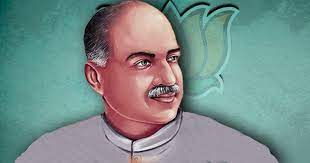- Following the Supreme Court’s decision to uphold the repeal of Article 370, many cited Dr Syama Prasad Mookerjee (1901-53), an outspoken opponent of Kashmir’s’special status’ in the Indian Union.
Syama Prasad Mookerjee, who was he?
- Syama Prasad Mookerjee, an influential Indian politician, attorney, and professor, was instrumental in establishing India’s political environment throughout the mid-twentieth century.
- Mookerjee, who was born on July 6, 1901, in Kolkata (formerly Calcutta), rose to prominence as a significant leader and ardent supporter of Indian nationalism and Hindu politics.
Early Childhood and Education
- Mookerjee was born into a prominent Brahmin family from Jirat, Hooghly District, in West Bengal.
- He succeeded intellectually, attending prestigious institutes such as Presidency College and the University of Calcutta.
- Mookerjee was admitted to the English Bar and became a lawyer after studying at Lincoln’s Inn in London.
Political Career
- Mookerjee began his political career as a member of the Indian National Congress, representing Calcutta University in the Bengal Legislative Council.
- Hindu Mahasabha affiliation: He then became president of the Hindu Mahasabha, a right-wing Hindu nationalist organisation.
- Mookerjee strongly lobbied for Bengal division to protect Hindu interests, which resulted in the foundation of a distinct West Bengal within the Indian Union.
- Mookerjee resigned as Finance Minister of Bengal Province in 1942, citing the British government’s harsh policies and attempts to retain control of India.
Contributions to the Independence of India
- Minister for Industry and Supply: After independence, Mookerjee served as India’s first Minister for Industry and Supply in Jawaharlal Nehru’s government.
- Nehru-Liaquat Pact and resignation: In 1950, he resigned from Nehru’s government in protest of the Nehru-Liaquat Pact, which he claimed jeopardised Hindu interests in East Bengal (now Bangladesh).
- Mookerjee founded the Bharatiya Janata Sangh in 1951 with the backing of the Rashtriya Swayamsevak Sangh (RSS), establishing the groundwork for the Bharatiya Janata Party (BJP).
Mookerjee’s Opposition to Article 370
- Mookerjee was convinced that Article 370 fostered a sense of separatist and separation inside the country, leading to the fracturing of India’s unity.
- Mookerjee famously declared, “Ek desh mein do Vidhan, do Pradhan aur Do Nishan nahi chalenge” (One nation cannot have two constitutions, two prime ministers, and two flags), emphasising his opposition to Jammu and Kashmir’s distinct status.
- Reservations regarding special status: Mookerjee voiced worry that Jammu and Kashmir’s unique status conferred under Article 370 might delay the state’s complete integration into the Indian Union.
- Inequality and separatist: He argued that extending special favours to one state based on religion or geographical considerations would breed inequality and separatism.
Ideological Position and Legacy
- Influence on the BJP’s policy agenda: His ideas and vision continue to drive the Bharatiya Janata Party’s policies and agenda.
- Mookerjee’s premature death in captivity in 1953 remains a source of contention and intrigue, with calls for an independent investigation.
Source: https://www.constitutionofindia.net/members/syama-prasad-mookerjee/

